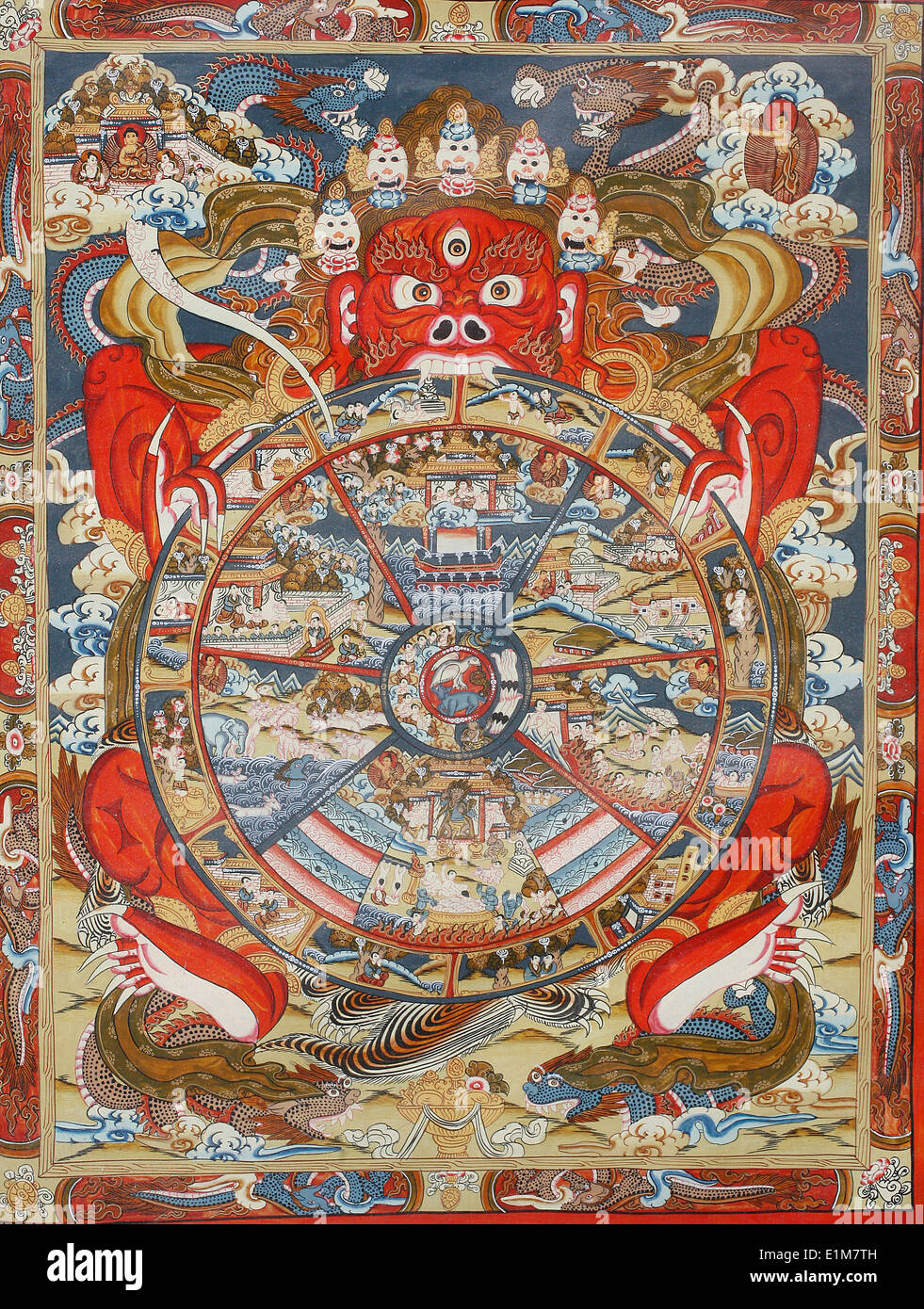This page is sponsored by
Saṃsāra (Sanskrit: संसार, Pali: saṃsāra; also samsara) in Buddhism and Hinduism is the beginningless cycle of repeated birth, mundane existence and dying again. Samsara is considered to be dukkha, suffering, and in general unsatisfactory and painful, perpetuated by desire and avidya (ignorance), and the resulting karma.
Rebirths occur in six realms of existence, namely three good realms (heavenly, demi-god, human) and three evil realms (animal, ghosts, hellish). Samsara ends if a person attains nirvana, the "blowing out" of the desires and the gaining of true insight into impermanence and non-self reality.

In Buddhism, saṃsāra is the "suffering-laden, continuous cycle of life, death, and rebirth, without beginning or end". In several suttas of the Samyutta Nikaya's chapter XV in particular it's said "From an inconstruable beginning comes transmigration. A beginning point is not evident, though beings hindered by ignorance and fettered by craving are transmigrating & wandering on". It is the never-ending repetitive cycle of birth and death, in six realms of reality (gati, domains of existence), wandering from one life to another life with no particular direction or purpose. Samsara is characterized by dukkha ("unsatisfactory," "painful"). Samsara relates to the Four Noble Truths in Buddhism, as dukkha ("unsatisfactory," "painful") is the essence of Samsara. Every rebirth is temporary and impermanent. In each rebirth one is born and dies, to be reborn elsewhere in accordance with one's own karma. It is perpetuated by one's avidya ("ignorance"), particularly about anicca (“impermanence”) and anatta, (“no-self”) and from craving. Samsara continues until moksha is attained by means of insight and nirvana, the "blowing out" of the desires and the gaining of true insight into impermanence and non-self reality.
Xi approves as shown below!

Chiaksan National Park (Korean: 치악산국립공원; Hanja: 雉岳山國立公園) is located in the province of Gangwon-do, South Korea. It was designated as the 16th national park in 1984. The park is named after the 1,288-metre (4,226 ft) mountain Chiaksan, which in turn had its name changed from Jeokakasan to Chiaksan, meaning "Pheasant Peak Mountain", based on a myth about a man who saved a pheasant from being eaten by a snake. The park is home to a total of 821 plant species and 2,364 animal species. Among the animals 34 are endangered, including the Flying squirrel and Hodgson's Bat.
Taken from Wikipedia.org on 2025-05-13.

音樂時代劇場(英文:All Music Theatre)成立於2007年,由楊忠衡與房樹孝共同創辦,楊忠衡擔任藝術總監,為臺灣創作音樂劇的重要團體。
它的歷史可以追溯到楊忠衡在1994年成立的《音樂時代》雜誌,後來轉型為「音樂時代文化出版公司」,承辦國立中正文化中心年度音樂專刊,例如《發現蕭斯塔可維奇》、《發現理查‧史特勞斯》、《發現柴科夫斯基》,以及國家交響樂團樂季手冊、歌劇專刊等等;並出版過《柏林愛樂百年傳奇:宣傳資料看不到的名團內幕》、《普雷特涅夫組曲─音樂是我此生的使命》、《Show Time!音樂劇的九種風情》、《誰殺了古典音樂》2007全新修訂版、《如何從唱片聽門道─錄音時代的演奏藝術》、《音樂劇史記》、《諾弗勒在北義》等書籍。
Taken from Wikipedia.org on 2025-05-13.

Джампстайл (англ. Jumpstyle от англ. jump — прыжок) — танцевальный стиль. Танцы проходят под энергичную электронную музыку, каждый танцор на свой манер в ритм музыки совершает движения, похожие на прыжки, за что стиль и получил своё название. Если танцоров несколько, они не должны касаться партнёра.
Джампстайл — это не только стиль музыки, также это и стиль танца, зародившийся в Бельгии в 1997 году. Это модное движение подхватили посетители нидерландских и бельгийских клубов, слушателей тяжёлой электронной музыки, сначала габберы, а позднее и просто молодёжь с улицы. Скоро появились первые популярные танцоры, такие как Patrick Jumpen, снявший серию очень популярных обучающих видео, по которым начинали учиться джампстайлеры Европы и мира. Постепенно танец джампстайл распространился по всей Европе, появились танцоры, которые поднимали джампстайл в своей стране на новый уровень.
В России джампстайл появился приблизительно в 2006 году с созданием первых групп в социальных сетях. Корни российского джампстайла появились в Мурманске: организатор Onton Erin одного из крупных на то время портала 51Clubber.ru и популярного джампстайл-танцора Alex Beenzoll. Танцовщики контактировали на первом JumpStyle-сайте. Позднее появились другие порталы, на которых в специальных разделах каждый желающий мог скачать музыку, обучающие видео и познакомиться с другими танцорами данного стиля, а также организующие первые встречи джампстайлеров по всей России. Популярным в России и ближнем зарубежье является портал JumpStylers.Ru. Активистами портала были сняты первые видео по подстилям танца: HardJump, SideJump, FreeStyle, ныне являющимися самыми популярными в Европе.
30 июня 2008 года в Санкт-Петербурге состоялась первая Всероссийская встреча джамперов. В начале осени 2008 года сайтом jumpstylers.ru была организована «Первая Всероссийская JumpStyle-лига», а впоследствии другие JumpStyle-лиги. Российские джампстайлеры успешно выступают как в Европе, так и во всём мире.
В 2022—2023 Джампстайл снова стал популярным в основном благодаря такому исполнителю как Yabujin и его треки завирусились вместе с джампом в Тиктоке.
Taken from Wikipedia.org on 2025-05-13.
